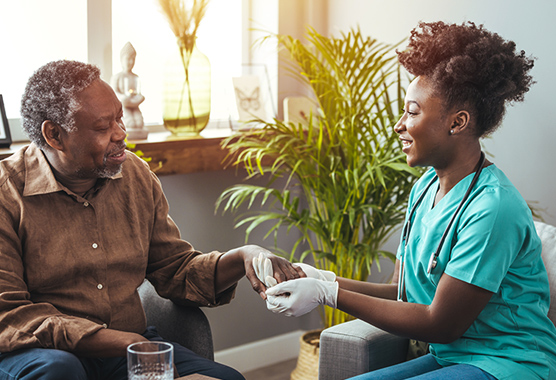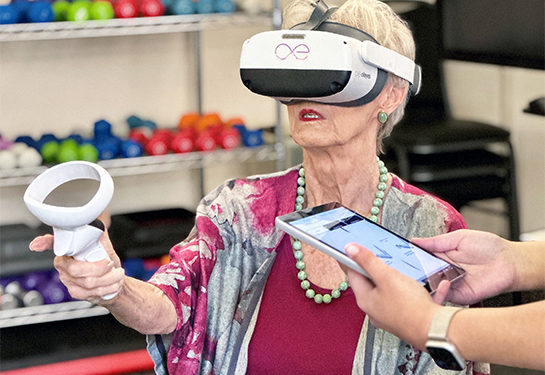Parkinson’s Disease
A team of specialists at the UC Davis Parkinson’s Disease Multidisciplinary Clinic provides high-level, compassionate care. We work as a collaborative team to help you navigate this complex condition and live your best life.
Medically reviewed by Norika Malhado-Chang, M.D. on May 09, 2024.

What Is Parkinson’s Disease?
Parkinson’s disease is a movement disorder that causes tremors, balance problems, muscle stiffness and slowed movements. This neurodegenerative disease damages nerve cells in your brain that control coordination and muscle movements.
Parkinson’s disease symptoms get worse over time. However, advanced treatments and services can slow disease progression, improving your quality of life.
You receive this specialized care and more at the region’s first Parkinson’s Multidisciplinary Center of Excellence. We’re also home to the region’s first Parkinson’s Foundation Center of Excellence, part of the UC Davis Center for Movement Disorders and Neurorestoration.
Parkinson’s Disease Symptoms
Parkinson’s disease affects everyone differently. Initially, mild symptoms may only affect one side of your body. As the disease progresses, symptoms can affect both sides. Mobility and daily activities often become more challenging.
Common Symptoms
Signs of Parkinson’s disease include:
- Balance and coordination problems
- Difficulty using your hands and fingers (impaired dexterity)
- Hand and leg tremors
- Limb stiffness
- Slowed movements and walking
Parkinson’s Disease Causes and Risk Factors
Parkinson’s disease occurs when proteins build up in nerve cells in your brain. These proteins damage or destroy the nerve cells that control movement.
Some people inherit a specific gene change (mutation) that leads to Parkinson’s disease. As many as 1 in 4 people with Parkinson’s disease have a relative with the disease.
Several factors may increase your risk of developing Parkinson’s disease.
Age
Advanced age is the main risk factor for many neurodegenerative diseases, including Parkinson’s disease. Signs of the disease typically occur around age 60.
Biological Sex
Males are 1.5 times more likely to get Parkinson’s disease than females.
Toxins
Exposure to certain pesticides or toxins may increase your risk.
Diagnosing Parkinson’s Disease
Diagnosing Parkinson’s disease can be challenging. Other movement disorders share similar symptoms. Diagnosis relies on careful evaluation not only of your symptoms but of your body as a whole. As a Parkinson’s Foundation Center of Excellence, our team has the clinical expertise to provide an accurate diagnosis.
Parkinson’s is a clinical diagnosis based on a detailed interview and neurologic examination. In certain cases, it may be necessary to do additional testing, such as:
- Drug challenge test: Your provider checks to see if your symptoms get better after taking a dopamine replacement medication (levodopa). Symptom improvement may indicate Parkinson’s disease.
- Neuroimaging: Medical imaging tests, such as a brain MRI, can rule out other conditions.
- Skin Biopsy: A Syn-One Test® detects abnormal proteins in the skin that may indicate Parkinson’s disease.
- Dopamine transporter scan (DaTscan): This nuclear imaging test uses a safe radioactive substance to view the brain’s dopamine system.
- Genetic testing: This specialized blood test checks for specific gene changes (mutations) that cause Parkinson’s disease in a small number of people.
Parkinson’s Disease Treatments
Our nationally recognized Parkinson’s Multidisciplinary Clinic brings together all the specialists and therapies you need in one convenient location. We develop a customized treatment plan for your unique symptoms and needs.
Medications
Medications can ease symptoms by acting on neurotransmitters (brain chemicals) like dopamine.
Physical, Occupational and Speech Therapy
Neurophysical therapy helps with walking, balance, and overall mobility. Occupational therapy helps with finger dexterity, daily tasks, and the use of assistive devices. Speech therapy works on voice, speech clarity, and swallowing.
Deep Brain Stimulation (DBS)
DBS uses surgically implanted electrodes to send mild electrical currents to areas of the brain. The treatment can improve tremors, muscle stiffness, slowed movements, and overall mobility.
Clinical Trials
Our movement disorder specialists are active in the latest research and clinical trials. You may be able to try promising new therapies still in development.
Preventing Parkinson’s Disease
Exercise is the single best thing you can do to lower your risk of developing Parkinson’s disease. There’s also evidence that minimizing your exposure to pesticides and toxins helps.
“Parkinson’s disease,” National Institute of Neurological Disorders and Stroke, https://www.ninds.nih.gov/health-information/disorders/parkinsons-disease
“Ageing as a risk factor for neurological diseases,” Nature Reviews Neurology, https://pubmed.ncbi.nlm.nih.gov/31501588/
“Parkinson’s disease,” MedlinePlus, https://medlineplus.gov/parkinsonsdisease.html
“Statistics: Who has Parkinson’s?” Parkinson’s Foundation, https://www.parkinson.org/understanding-parkinsons/statistics
There are about
1MAmericans who have Parkinson’s disease
Statistics show
90KAmericans are diagnosed each year
Source: Parkinson’s Foundation: Statistics: Who has Parkinson’s?
Request an Appointment
As Sacramento's No. 1 hospital, you'll benefit from unique advantages in primary care and specialty care. This includes prevention, diagnosis and treatment options from experts in 150 specialties.
Referring Physicians
To refer a patient, submit an electronic referral form or call.
800-4-UCDAVIS
Patients
Call to make an appointment.
Consumer Resource Center
800-2-UCDAVIS

Ranked among the nation’s best hospitals
A U.S. News & World Report best hospital in cardiology, heart & vascular surgery, diabetes & endocrinology, ENT, geriatrics, neurology & neurosurgery, and pulmonology & lung surgery.

Ranked among the nation’s best children’s hospitals
U.S. News & World Report ranked UC Davis Children’s Hospital among the best in pediatric nephrology, orthopedics*, and pulmonology & lung surgery. (*Together with Shriners Children’s Northern California)

Ranked Sacramento’s #1 hospital
Ranked Sacramento’s #1 hospital by U.S. News, and high-performing in aortic valve surgery, back surgery (spinal fusion), COPD, colon cancer surgery, diabetes, gynecological cancer surgery, heart arrhythmia, heart failure, kidney failure, leukemia, lymphoma & myeloma, lung cancer surgery, pacemaker implantation, pneumonia, prostate cancer surgery, stroke, TAVR, cancer, orthopedics, gastroenterology & GI surgery, and urology.

The nation’s highest nursing honor
UC Davis Medical Center has received Magnet® recognition, the nation’s highest honor for nursing excellence.

World-class cancer care
One of ~59 U.S. cancer centers designated “comprehensive” by the National Cancer Institute.

A leader in health care equality
For the 13th consecutive year, UC Davis Medical Center has been recognized as an LGBTQ+ Healthcare Equality Leader by the educational arm of America’s largest civil rights organization.

